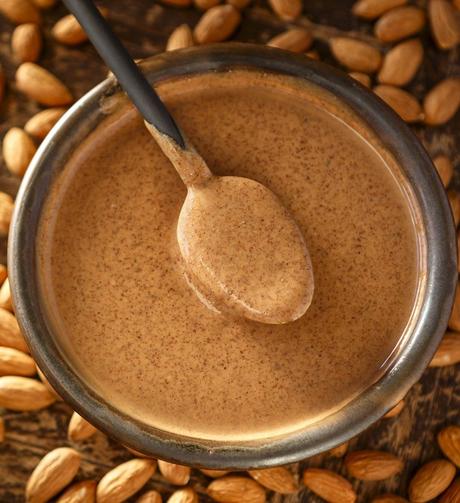
Almond butter is a type of nut butter made by grinding raw or roasted almonds into a rich, creamy paste. It is rich in healthy fats, protein, and fiber as well as vitamins and minerals. This neutral-flavored butter can be found in either crunchy or smooth varieties and is a wonderful ingredient to add to your diet.
You can use almond butter as a condiment, to make smoothies, and in both savory and baking recipes. However, if you're allergic to almond butter or are just looking for nut butter or another ingredient with the same taste and consistency, these almond butter substitutes will please both your tastebuds and health in one go.
1. Cashew Butter
Cashew butter is a nut butter made with roasted cashews and has a delicate, naturally sweet flavor and a smooth, creamy texture. It contains less protein than almond butter but is packed with monounsaturated fats and antioxidants, which makes it a terrific addition to your diet.
You can use cashew butter as a spread for your morning toast, combine it with jelly in your sandwiches, or serve it as a dip for your fruits and desserts. The only drawback is that cashew butter can be pricier. But, if you're not restricted by budgeting demands, you should definitely give this substitute a try to take your meals to the next level.
1 teaspoon almond butter = 1 teaspoon cashew butter.
2. Greek Yogurt
Greek yogurt may seem like an odd choice, but its thick and velvety texture and sweet and slightly tangy flavor is very similar to almond butter. It is also loaded with vitamins and minerals, which makes it perfect for low-calorie and low-fat diets.
Greek yogurt can add a rich, creamy flavor and a boost of protein to any dish. It is not spreadable though, so it would be best to restrict its use to baked goods where it would add a tart flavor to your dishes. It also comes in various flavors, so you can choose a plain or flavored version depending on whether or not you want to add any flavors to your recipes.
1 teaspoon almond butter = 1 1/2 teaspoon Greek yogurt.
3. Mashed Avocado
Avocado has an avid fan following among health nuts, and for good reason. It has a rich, smooth, butter-like texture and a slightly nutty flavor similar to almond butter, which makes it a good substitute. More importantly, avocados are high in healthy fats and low in calories while being rich in nutrients.
Besides using it to make guacamole or spreading mashed avocado on your breakfast toast, you can use this superfood in various recipes. Avocado gives dishes a fluffy and creamy texture and can be added to baked recipes to produce heavenly treats without having to use butter. However, as it doesn't melt, you might need to add more liquid to achieve the proper consistency.
1 teaspoon almond butter = 1 teaspoon mashed avocado.
4. Peanut Butter
Peanut butter is a nut-based butter made from peanuts. Packed with protein and high in carbohydrates, peanut butter is super delicious and perhaps the most popular nut butter. It is available in smooth, chunky, stir, and stir-free consistencies, making it an easy, affordable stand-in for almond butter.
You can use this versatile nut butter as a sandwich spread, with oatmeal or smoothie bowls, or to flavor cookies and cakes - the possibilities are endless. It has a sweeter flavor than almond butter, so you may have to use fewer sweeteners than your recipe calls for. Different peanut butter brands may also have additional ingredients, so make sure to read the ingredient list carefully to complement your healthy diet.
1 teaspoon almond butter = 1 teaspoon peanut butter.
5. Pumpkin Seed Butter
Pumpkin seed butter is a protein-rich butter made from roasted pumpkin seeds, also known as pepitas. It is a healthy source of fats, fiber, and vitamins and minerals like iron and magnesium. It has a mild, nutty taste with hints of earthiness and is creamy and green in color.
You can use pumpkin seed butter to make cakes, cookies, sandwiches, and even smoothies! It is a wonderful alternative to both almond and peanut butter and is great if you're dealing with nut allergies. However, pumpkin seed butter tends to be blander than almond butter, so you'll have to taste-test as you go to get the right flavor.
1 teaspoon almond butter = 1 teaspoon pumpkin seed butter.
6. Sunflower Seed Butter
Sunflower seed butter is made by roasting sunflower seeds and then grounding them into a smooth paste. It has a creamy and nutty flavor similar to almond butter and is also a good source of healthy fats, minerals, protein, and vitamins.
The deep, rich taste of sunflower butter works amazingly in a number of dishes. Although it is less creamy than almond butter, it can be spread on toast, used as a dip, or added to any other recipes that call for almond butter. However, keep in mind that sunflower butter undergoes a chemical reaction with baking soda in baked goods. Hence, it would be best to reduce the amount of baking soda the dish calls for by one-third.
1 teaspoon almond butter = 1 teaspoon sunflower butter.
7. Walnut Butter
Walnut butter is made from ground walnuts. It is creamy and has a nutty similar to almond butter, although walnut butter leaves a bitter aftertaste. Despite this difference in flavor, it still works well as a good almond butter substitute. It also offers lots of health benefits, making it a healthy swap.
Walnut butter can be used to make a range of vegan treats. However, depending on how you're using it, you may need to modify the amount of sugar in your recipe. It also leaves a bitter aftertaste, so you consider adding honey or another sweetener if you're eating it with your morning toast.
1 teaspoon almond butter = 1 teaspoon walnut butter.
